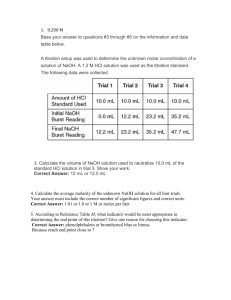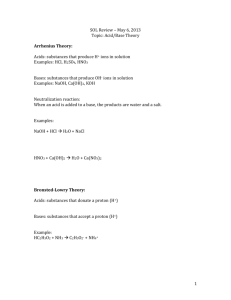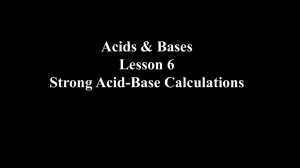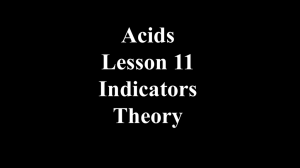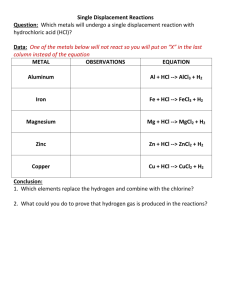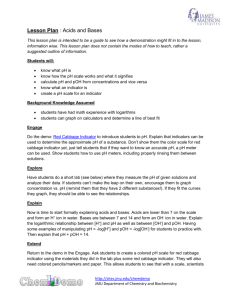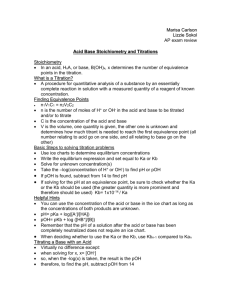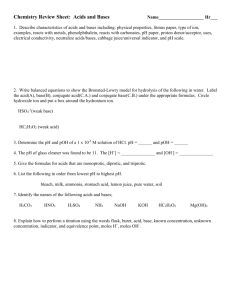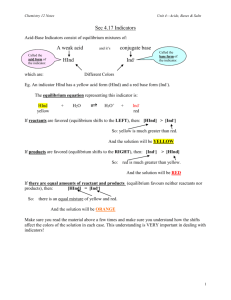Ka and Kb Calculations
advertisement
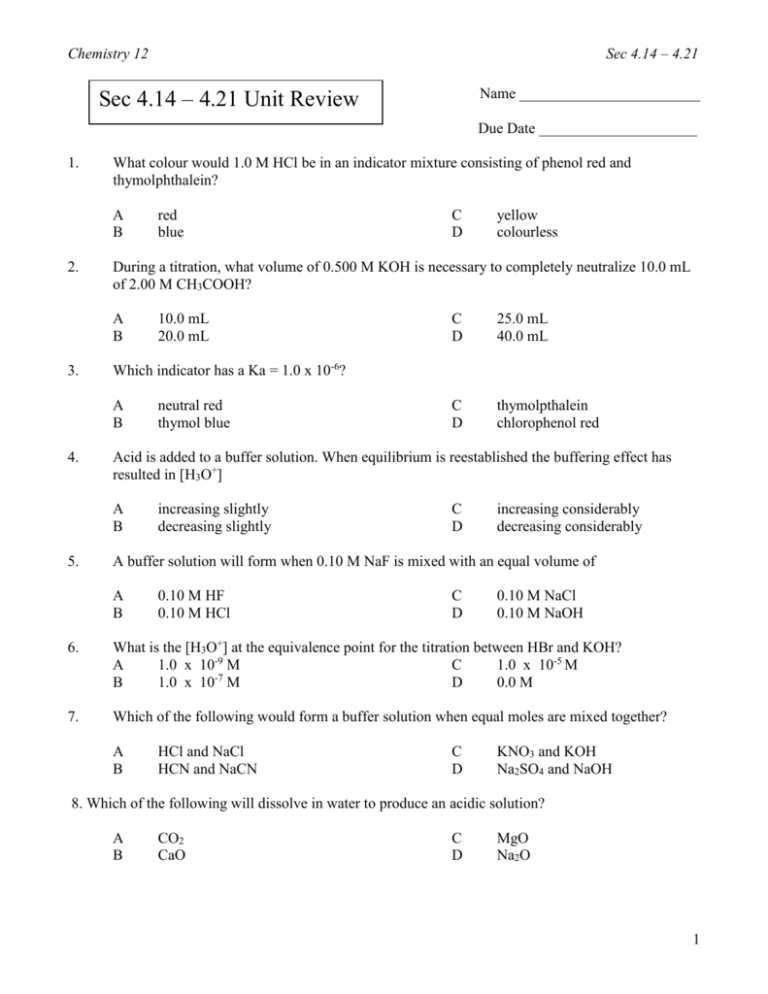
Chemistry 12 Sec 4.14 – 4.21 Name ________________________ Sec 4.14 – 4.21 Unit Review Due Date _____________________ 1. What colour would 1.0 M HCl be in an indicator mixture consisting of phenol red and thymolphthalein? A B 2. 10.0 mL 20.0 mL C D 25.0 mL 40.0 mL neutral red thymol blue C D thymolpthalein chlorophenol red Acid is added to a buffer solution. When equilibrium is reestablished the buffering effect has resulted in [H3O+] A B 5. yellow colourless Which indicator has a Ka = 1.0 x 10-6? A B 4. C D During a titration, what volume of 0.500 M KOH is necessary to completely neutralize 10.0 mL of 2.00 M CH3COOH? A B 3. red blue increasing slightly decreasing slightly C D increasing considerably decreasing considerably A buffer solution will form when 0.10 M NaF is mixed with an equal volume of A B 0.10 M HF 0.10 M HCl C D 0.10 M NaCl 0.10 M NaOH 6. What is the [H3O+] at the equivalence point for the titration between HBr and KOH? A 1.0 x 10-9 M C 1.0 x 10-5 M -7 B 1.0 x 10 M D 0.0 M 7. Which of the following would form a buffer solution when equal moles are mixed together? A B HCl and NaCl HCN and NaCN C D KNO3 and KOH Na2SO4 and NaOH 8. Which of the following will dissolve in water to produce an acidic solution? A B CO2 CaO C D MgO Na2O 1 Chemistry 12 9. In a titration, which of the following has a pH = 7.00 at the equivalence point? A B 10. NH3 and HNO3 KOH and HCl 1 x 10-14 1 x 10-8 weak acid with a weak base strong acid with a weak base weak acid and strong base strong acid and strong base C D weak acid with a strong base strong acid with a strong base C D weak acid and its conjugate base strong acid and its conjugate base A gas which is produced by burning coal and also contributes to the formation of acid rain is A B 14. 1 x 10-6 1 x 10-3 A buffer solution may contain equal moles of A B 13. C D Which of the following titrations will always have an equivalence point at a pH > 7.00? A B 12. NaF and HCl Ca(OH)2 and CH3COOH What is the approximate Ka value for the indicator chlorophenol red? A B 11. C D Sec 4.14 – 4.21 H2 O3 C D SO2 C3H8 When the indicator thymol blue is added to 0.10 M solution of an unknown acid, the solution is red. The acid could be A B HF H2S C D HCN HNO3 15. Consider the following graph for the titration of 0.1 M NH3 with 1.0 M HCl. pH 14 I II 7 III IV 0 Volume HCl added A buffer solution is present at point A. I B. II C. III D. IV 2 Chemistry 12 Sec 4.14 – 4.21 16. Consider the following equilibrium system for an indicator: HInd + H2O ⇄ H3O+ + IndWhich two species must be of two different colours in order to be used as an indicator? A. B. HInd and H2O HInd and Ind- C. D. H3O+ and IndHind and H3O+ C. D. thymol blue methyl violet 17. Which of the following indicators is yellow at pH 10.0? A. B. methyl red phenol red 18. A sample containing 1.20 x 10-2 mole HCl is completely neutralized by 100.0 mL of Sr(OH)2. What is the [Sr(OH)2]? A. B. 6.00 x 10-3 M 6.00 x 10-2 M C. D. 1.20 x 10-1 M 2.4 x 10-1 M 19. Which of the following titrations will have the highest pH at the equivalence point? A. B. HBr with NH3 HNO2 with KOH C. D. HCl with Na2CO3 HNO3 with NaOH C. D. 13.00 14.10 20. The pH of 0.10 M KOH solution is A. B. 0.10 1.00 21. An indicator changes colour in the pH range 9.0 to 11.0. What is the value of the Ka for the indicator? A. B. 1 x 10-13 1 x 10-10 C. D. 1 x 10-7 1 x 10-1 22. Which of the following always applies at the transition point for the indicator Hind? A. B. [Ind-] = [OH-] [HInd] = [Ind-] C. D. [Ind-] = [H3O+] [HInd] = [H3O+] 23. Consider the following equilibrium for an indicator: HInd + H2O ⇄ H3O+ + IndIn a solution of pH of 6.8, the colour of bromthymol blue is A. B. blue because [HInd] = [Ind-] green because [HInd] = [Ind-] C. D. green because [HInd] < [Ind-] yellow because [HInd] > [Ind-] C. D. indigo carmine phenolphthalein 24. The indicator with Ka = 4 x 10-8 is A. B. neutral red methyl red 3 Chemistry 12 Sec 4.14 – 4.21 25. In a titration a 25.00 mL sample of Sr(OH)2 is completely neutralized by 28.60 mL of 0.100 M HCl. The concentration of the Sr(OH)2 is A. B. 1.43 x 10-3 M 2.86 x 10-3 M C. 5.72 x 10-2 M D. 1.14 x 10-1 M Sec 4.14 – 4.15 Ka and Kb Calculations 1. Calculate the [H+], [OH-], pH, and pOH for 0.20 M HCN. [H+] = 2. [OH-] = [OH-] = pH = pOH = Calculate the [H+], [OH-], pH, and pOH for 0.805 M CH3COOH. [H+] = 4. pOH = Calculate the [H+], [OH-], pH, and pOH for 2.20 M HF. [H+] = 3. pH = [OH-] = pH = pOH = Calculate the [H+], [OH-], pH, and pOH for 1.65 M H3BO3. [H+] = [OH-] = pH = pOH = 5. Calculate the pH of a saturated solution of Mg(OH)2. tough one! Feel free to Skip this question 6. Calculate the pH of a 0.200 M weak diprotic acid with a Ka = 1.8 x 10-6. 7. 350.0 mL of 0.20M Sr(OH)2 is diluted by adding 450.0 mL of water, calculate the pH of the solution. 8. How many grams of CH3COOH are dissolved in 2.00 L of a solution with pH = 2.45? Sec 4.16, 4.18 Titration 1. Calculate the volume of 0.200M H2SO4 required to neutralize 25.0 ml of 0.100M NaOH. 2. Describe how a primary standard is used.________________________________________ ___________________________________________________________________________ _____________________________________________________________________________ 4 Chemistry 12 Sec 4.14 – 4.21 3. Consider the following reaction: 2HCl + Ba(OH)2 → BaCl2 + 2H2O When 3.16g samples of Ba(OH)2 were titrated to the equivalence point with an HCl solution, the following data was recorded. Trial #1 #2 #3 Volume of HCl added 37.80 mL 35.49 mL 35.51 mL Calculate the original [HCl] 4. What type of titration curves are buffer regions found? Why? ___________________________ _________________________________________________________________________________ _________________________________________________________________________________ 5. What indicator would be used if the equivalence point has a pH of 4.5? Why? ________________ _________________________________________________________________________________ _________________________________________________________________________________ 6. Draw the following titration curves. Accurately label the initial and final pH and the equivalence point. Label the axis. Strong acid – Strong Base Weak Acid - Strong Base Initial pH = _________________ Initial pH = _________________ pH at EP = _________________ pH at EP = _________________ final pH = _________________ final pH = _________________ 5 Chemistry 12 Sec 4.14 – 4.21 Weak Base – Strong Acid Strong Base – Strong Acid Initial pH = _________________ Initial pH = _________________ pH at EP = _________________ pH at EP = _________________ final pH = _________________ final pH = _________________ The following titration curve results from titrating 25.0 mL of a 0.10 M Weak Acid HA with a Strong Base KOH: Tit rat io n o f we a k a c id (2 5 c m ³) wi th s t ro n g b a s e. 14 12 10 8 pH 6 4 2 0 10 20 Volume of KOH (mL) 30 40 50 vo lu m e (c m ³) a.) Use this graph to estimate the Ka of the acid HA. b.) Use this graph to calculate the [KOH]. 6 Chemistry 12 Sec 4.14 – 4.21 Sec 4.17 Indicators 1. Definition 2. Equilibrium equation 3. Colors for methyl orange 4. Compare the relative sizes of [HInd] and [Ind-] at the following pH’s for methyl orange. Ind- HInd Color Relationship pH = 2.0 pH = 3.7 pH = 5.0 5. 6. HCl is added to methyl orange, describe if each increases or decreases. [H+] [HInd] [Ind-] Color Change NaOH is added to methyl orange, describe if each increases or decreases. [H+] [HInd] [Ind-] Color Change 7. State two equations that are true at the transition point of an indicator. 8. What indicator has a Ka = 4 x 10-8 9. What is the Ka for methyl orange? 10. A solution is pink in phenolphthalein and colorless in thymolphthalein. What is the pH of the solution? 11. A solution is blue in bromothymol blue, red in phenol red, and yellow in thymol blue. What is the pH of the solution? 7 Chemistry 12 Sec 4.14 – 4.21 Sec 4.19 Buffers 1. Definition 2. Acid Conjugate Base Salt HCN KHCO3 NH3 HF NaCH3COO HC2O43. Write an equation for the first three buffer systems above. 4. Which buffer could have a pH of 4.0? a) HCl & NaCl 5. b) HF & NaF Which buffer could have a pH of 10.0? c) NH3 & NH4Cl a) Predict how the buffer of pH = 9.00 will change. Your possible answers are 9.00, 8.98, 9.01, 2.00, and 13.00 Final pH 2 drops of 0.10 M HCl are added b) 1 drop of 0.10 M NaOH is added c) 10 mL of 0.10 M HCl are added 6. Write an equation for the carbonic acid, sodium hydrogencarbonate buffer system. A few drops of HCl are added. Describe the shift and each concentration change. Equation: Shift [H+] = [H2CO3] = [HCO3-] = 8 Chemistry 12 Sec 4.14 – 4.21 Sec 4.20 – 2.21 Anhydrides, Acid Rain 1. State whether the following compounds will act as acids (A) or bases (B) when added to water. (10 marks) a) FO2 ...... ___________ d) CO2 ...... ___________ b) CaO...... ___________ e) Ag2O ... ___________ c) Cr2O3 ... ___________ f) Cs2O ..... ___________ 2. a) Define a basic anhydride (1 mark) - 3. a) Define an acidic anhydride (1 mark) - 4. Normal (unpolluted) rain water usually has a pH of about _________. This is less than 7 due to __________gas dissolving in the air 5. “Acid rain” could be defined as rain having a pH below ___________. 6. Give two formula equations which show how sulphurous acid can be produced starting with sulphur. (2 marks) 1. 2. 7. Give three formula equations which show how sulphuric acid can be produced starting with sulphur. (3 marks) 1. 2. 3. 12. Give the balanced equation for the formation of NO2 from it’s elements. (1 mark) _________________________________________________________________ 13. Give the balanced equation for the formation of nitrous and nitric acid from NO2 dissolving in rain water. (1 mark) _________________________________________________________________ 9
